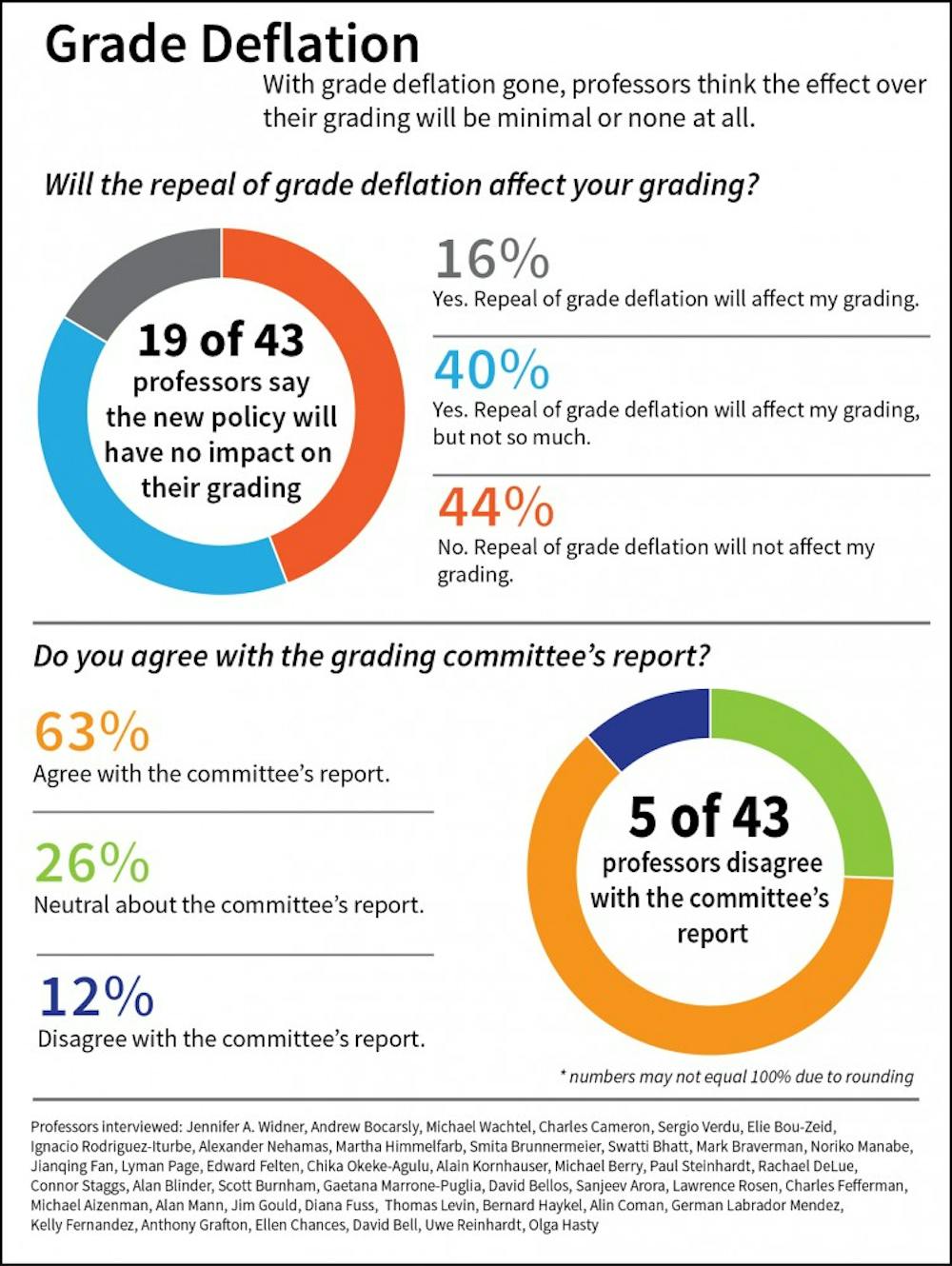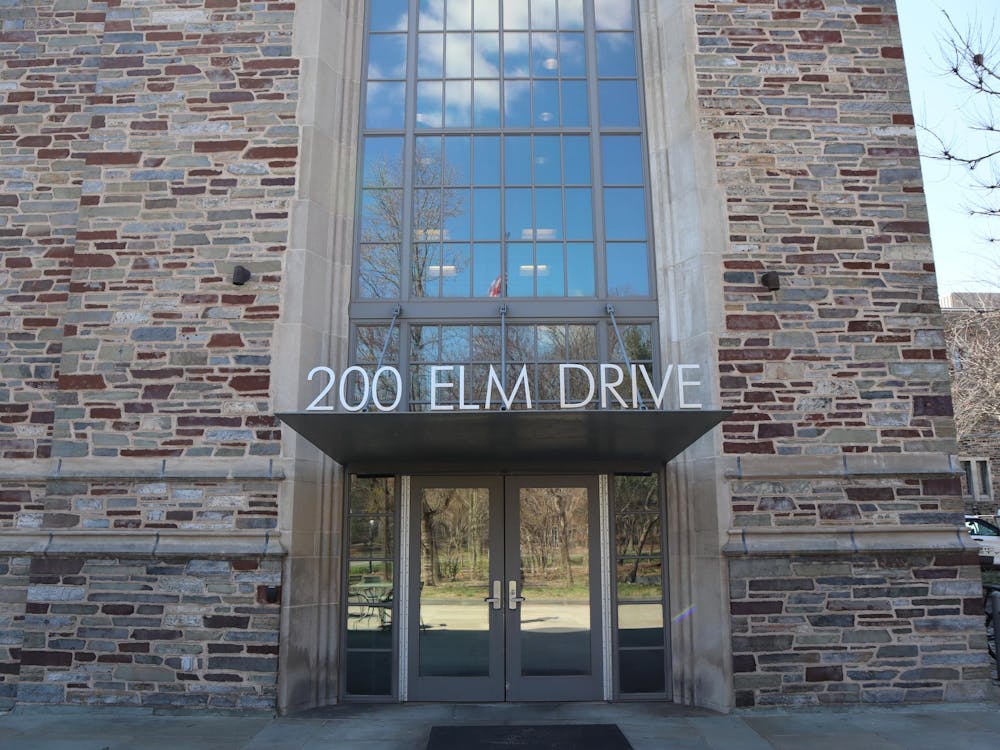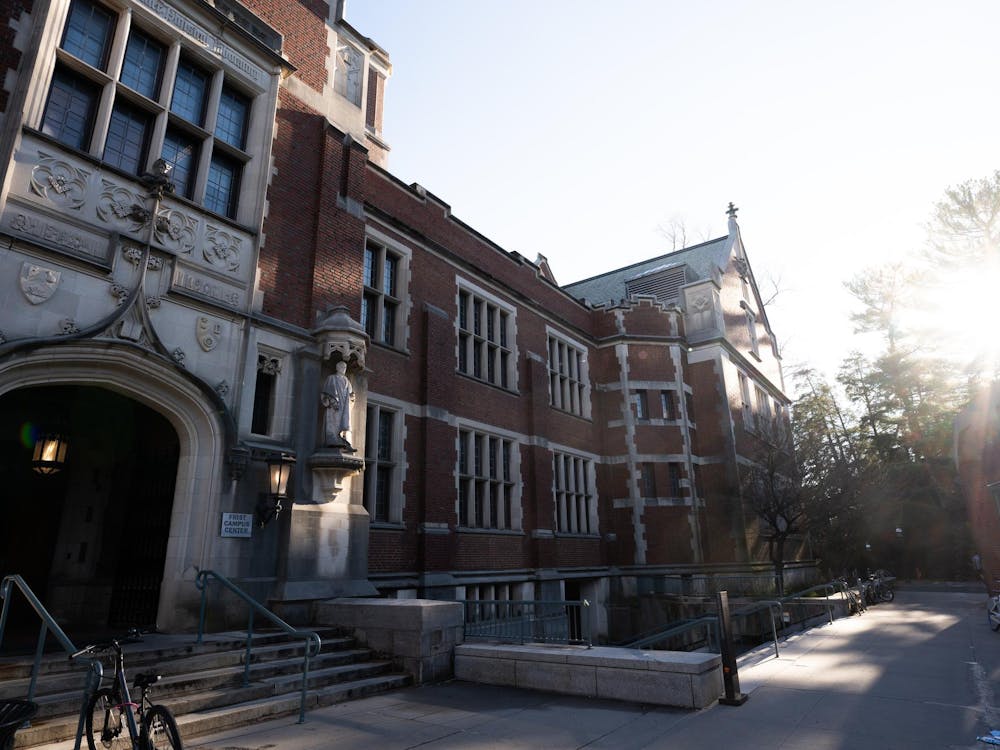Most professors do not think the repeal of the grade deflation policy will have a marked effect on their grading, according to close to 50 interviews conducted by The Daily Princetonian in the days since the faculty voted to strike down the policy.
While grading may not be affected, a slight majority of professors across multiple disciplines said they agreed with the conclusions of the Faculty Committee on Grading’s report. The report concluded that the number of A-range grades given at the University had decreased in the years immediately preceding the implementation of the grading policy. In addition, it said that there was a marked difference among departments between low and high-level courses.
The University’s new grading policy, which allows each department to determine its own grading standards, emphasizes the quality of feedback to students rather than a numerical quota. The Faculty Council on Teaching and Learning was formed concurrently to assess such student feedback.
Out of 46 professors interviewed, 27 said they supported the repeal of grade deflation, while five said they opposed it and 11 said they were neutral. Three said they had not read the report so they abstained from answering. Out of 43 professors who gave an answer on changing grade policies, seven said that the new policy would impact their grading, while 19 said the policy would have no impact and 17 said the policy would have some impact, but a very small one.
No humanities professors, three social science professors and four STEM professors said they opposed the new policy
Thirteen professors from humanities departments said they supported the new policy, along with seven from the social sciences and ten from STEM departments.
As for whether a repeal of grade deflation would affect grading, four humanities professors said it would impact their grading, while 11 said the policy would have no impact and four said it would have some impact but not much. Analogous numbers for other departments were three, two and seven for social sciences and four, seven and nine for the STEM departments.
The questions about grade deflation were not done as a survey; professors were instead individually asked about what their reactions to the policy were and whether or not it would change their grading.
“I think the committee’s report was excellent. It makes a lot of sense,” Slavic languages and literatures professor Olga Hasty said. “Approaching student work from the perspective of having a quota to fill can shift the focus of attention from the individual performance of the student to the quotas that are being filled. That can’t be fair. It’s not good for intellectual development. It’s not good for encouraging students.”
History professor David Bell said he thought the report made a great deal of sense and basically reinforced everything he himself had been thinking — the disadvantages of the grade deflation policy outweighed the advantages.
The main disadvantages of the grade deflation policy, according to professors, were the stress it provoked in students and the ill fit of one blanket policy for the diverse departments across the University.
“It’s been confirmed by our own experience that we have some of the most brilliant students in the world here at Princeton. I’m not prepared to be told that the moment this highly selective group of students gets to Princeton that all of a sudden, [some fixed number] are going to be C-students,” professor emeritus of English John Fleming said.

Fleming added that grade deflation was implemented to give a false or illusory impression of academic rigor, but that professors know how to be rigorous anyhow.
However, some professors did disagree. Economics professor Uwe Reinhardt noted that not having a single standard of grading could cheapen the value of individual courses.
“In the grading scheme, price is one over grade,” said Reinhardt. “So, if I give a lot of A’s, taking my course has a low price. Think of a downward sloping demand curve. To attract more students, I charge a lower price, meaning you can get an A from me for less work,” said Reinhardt.
A majority of professors, when asked if the repeal of grade deflation will affect grading, replied that it would not or that, if it did, the effect would be minimal.
“This is ‘new policy,’ but it’s the policy that was in effect before the 2004 change to ‘new grading policy,’” Slavic languages and literatures professor Ellen Chances said. “If you have a whole class that is really good, it discriminates against students to say that only 35 percent can get in the A-range. I always graded according to what the students deserved rather than having any kind of statistical grading policy. [Grade deflation] didn’t make sense ethically.”
Other professors do not believe the changes in grading policy are particularly noteworthy.
“I kind of think it’s been a big kerfuffle about very little. I’m not sure that our students have really been disadvantaged in graduate school and careers by grades that are slightly lower than elsewhere. The students that I know still seem to do extremely well,” history professor Anthony Grafton said.
Faculty members voted on Oct. 6 to repeal the grade deflation policy that had first been implemented in 2004. The Faculty Committee on Examinations and Standing announced in August that it would review the ad hoc committee’s report and bring the recommendations to the faculty for a vote in October, and the University had announced an Ad Hoc Committee to Review Policies Regarding Assessment and Grading to examine the effectiveness of the policy in October 2013.
“I think it’s really important that Princeton be known for the quality of its teaching rather than for the severity of its curve,” University President Christopher Eisgruber '83 said previously in a Daily Princetonian interview.









